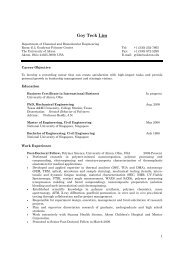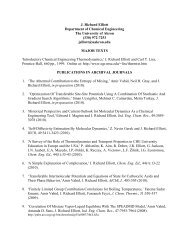Sociology of the Anarchists - Gozips.uakron.edu - The University of ...
Sociology of the Anarchists - Gozips.uakron.edu - The University of ...
Sociology of the Anarchists - Gozips.uakron.edu - The University of ...
You also want an ePaper? Increase the reach of your titles
YUMPU automatically turns print PDFs into web optimized ePapers that Google loves.
TEACHING<br />
Everywhere not only <strong>edu</strong>cation<br />
but society as a whole needs “deschooling”.<br />
- Ivan Illich<br />
Introduction:<br />
I am struck by how <strong>of</strong>ten “exerting authority” is mentioned by <strong>the</strong> graduate students<br />
writing in Hare, et al. (1999). <strong>The</strong>y accepted <strong>the</strong> same premise that many o<strong>the</strong>rs have<br />
recommended to me about maintaining “control” and “authority” over students in class.<br />
This is fascinating to me and also pretty disturbing. Although I see <strong>the</strong> functional reasons<br />
for this power differential, I wonder if <strong>the</strong>re is evidence to show that this translates into a<br />
conducive learning environment. I wonder because I know from my own student<br />
experiences that teachers who pushed us around brought out more rebellious tendencies<br />
in myself and o<strong>the</strong>r students; we would spend more time battling with <strong>the</strong> instructor than<br />
learning from <strong>the</strong>m.<br />
<strong>The</strong>re might also be an important distinction to make between being “authoritative”<br />
(knowing your topic) and being “authoritarian” (demanding submission to your rule). As<br />
someone who is almost medically-allergic to authority (ego-maniacs, presidents, and<br />
despots make my skin break out!), I am struggling with <strong>the</strong> advice I receive (“exert your<br />
authority in class”) and my preexisting ideology and leanings. I have no problem with<br />
following a syllabus and demanding adherence to it, but I have never liked lecturing as a<br />
hierarchist.<br />
This topic bleeds into ano<strong>the</strong>r interesting thread: gender and race. Being a white male, I<br />
am typically viewed as having less “to prove” to o<strong>the</strong>rs and already command respect<br />
based upon my skin color and gender. O<strong>the</strong>rs who do not have this birth-derived<br />
privilege, may need to find o<strong>the</strong>r ways <strong>of</strong> exerting <strong>the</strong>mselves in a classroom. Getting<br />
respect (i.e. that an instructor knows what <strong>the</strong>y are talking about) and being paid attention<br />
to may be more difficult for o<strong>the</strong>rs than for me, due to <strong>the</strong> illogical respect paid to white<br />
males. In a sense, I might have <strong>the</strong> luxury <strong>of</strong> not having to “exert my authority” because<br />
my presence may command more respect than o<strong>the</strong>rs'.<br />
McKeachie (2002) writes in chapter 23 <strong>of</strong> “teaching students to learn”. <strong>The</strong> process <strong>of</strong><br />
teaching goes far beyond just conveying ideas, information, and thoughts, and asking<br />
students to regurgitate <strong>the</strong>m back to <strong>the</strong> teacher. McKeachie emphasizes <strong>the</strong> importance<br />
<strong>of</strong> active agency on <strong>the</strong> part <strong>of</strong> <strong>the</strong> student—increasing <strong>the</strong>ir “self-awareness”, defining<br />
<strong>the</strong>ir own learning goals, self-evaluation, wanting to learn, etc. Helping students to think<br />
through <strong>the</strong>se processes (<strong>the</strong> means), instead <strong>of</strong> just providing or forcing one's own<br />
answers on <strong>the</strong>m (<strong>the</strong> ends), seems to be what he encourages. And I am in agreement with<br />
those conclusions, too.<br />
<strong>Sociology</strong> may be an easier topic than most (in some respect) because people come to<br />
most introductory courses with widely varying degrees <strong>of</strong> interest and prior knowledge.<br />
This discipline may make it easier because everyone has prior knowledge about society<br />
[ Williams 95 ] [ this is a draft. do not cite. ]






